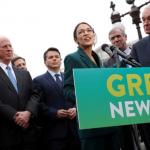Reject the 'Jobs Versus Environment' Narrative – We Can Do Both

It is a classic narrative: jobs versus the environment. We have heard it over and over again: “Blue-collar union workers,” the media says, are “rejecting Green New Deal Politics.” But the truth is that we can fight climate change and create millions of good, green, union jobs in the process. And, despite the rhetoric, a new poll by Data for Progress shows that the majority of union members agree.
In the poll, 1,012 voters representative of the broader electorate were asked if they support the Green New Deal. From what you hear in the media, you would probably expect union members would strongly oppose the Green New Deal. The actual response from union members? Sixty-two per cent support the Green New Deal, while just 22% oppose it.
Far from being opponents of climate action, rank-and-file union members understand that climate change is a real threat, that addressing it can create jobs and strengthen unions, and that the government has a responsibility to protect climate, communities and workers. Lost in this false choice between jobs or the climate is that union workers also live in communities and want to live in a clean, healthy environment.
Previous research indicates that union members have long been more supportive of climate protection policies than Americans as a whole. A study by Todd Vachon and Jeremy Brecher based on data from national surveys found that union members are on average more likely than the general population to display pro-environmental attitudes and behaviors.
For example, in the General Social Survey (GSS), people were asked to agree or disagree with the statement “We worry too much about the future of the environment and not enough about prices and jobs today”. More unionized respondents disagreed with this statement than nonunion respondents. In other words, unionized respondents were more likely to think we don’t worry enough about the future of the environment.
The media has propagated the false impression that union workers oppose climate action and the Green New Deal. By trumpeting the age-old “jobs v environment” framing, they are echoing Republican talking points, not reporting on the empirical data-driven truth.
Right now, many unions are reevaluating their approach to climate. While the AFL-CIO and most building trades unions have been critical of the Green New Deal, unions with millions of members have endorsed the progressive climate platform. America’s second largest union, the Service Employees International Union (SEIU), recently endorsed the Green New Deal. In doing so, the SEIU and other unions are simply following the lead of their members towards a more positive and hopeful view of the future rather than looking back, longingly, at a fading dirty energy past.
Joining SEIU, the Railroad Workers United and several state and local labor federations have voiced their support for the Green New Deal, including Maine’s AFL-CIO, the Los Angeles AFL-CIO and the San Francisco Labor Council.
Moreover, labor unions have been integral to climate jobs campaigns. In New York state, for instance, labor unions have not only worked in coalition with environmental groups and communities of color, but have also played a major role in advancing and passing climate legislation.
These campaigns include Climate Jobs New York, a coalition of unions advocating for substantial greenhouse gas reductions and good, family-sustaining jobs. New York’s governor, Andrew Cuomo, in partnership with CJNY and the Worker Institute at Cornell University, developed the Clean Climate Careers Initiative, which committed up to $1.5bn to create 40,000 jobs in climate friendly industries.
The NY Renews coalition, which includes labor unions, community groups, faith-based organizations, environmental justice organizations and green groups, just scored a huge victory in passing the most ambitious climate plan in the country, which targets an 85% reduction in greenhouse gas emissions below 1990 levels by 2050, 100% carbon neutral electricity by 2040, and dedicated funding to low-income communities across the state. These campaigns show that we can have climate protection and good jobs. They also show that, far from being enemies of climate action, unions can be key drivers of it.
These state campaigns are also on the ground examples of how we implement a Green New Deal. The Green New Deal moves beyond carbon reduction to address the whole picture of the climate crisis: rising seas alongside rising inequality. As a result, good jobs, investment in underserved communities and carbon reduction are equally needed to fully address the climate crisis. And, as seen in New York, it can be done. We can, and must, adopt a Green New Deal.
Rather than focus on the misleading and inaccurate narrative of union opposition to climate legislation, politicians, activists and journalists should discuss union’s environmental priorities. To help kickstart that conversation, Data for Progress has put together a toolkit to help allies identify pro-union climate policies.
These include procurement policies such as Buy Clean, which uses the power of the government purse to reduce emissions and empower unions. It includes implementing project labor agreements to ensure unions have collective bargaining power and receive good benefits and a family-sustaining wage. And it includes strong public investment in communities to guarantee jobs, strengthen the social safety net and maintain wages, benefits, pensions and healthcare in the transition to a green economy.
Most Democratic voters recognize, intuitively, that climate change is an existential threat and support a Green New Deal. Indeed, so does half of the American electorate. But the impression that unions and their members oppose the platform has led to hesitation and second thoughts on the part of elected officials, aspiring candidates and political elites.
Polling data on union members’ support for the Green New Deal should put those fears to rest. The union rank-and-file, like the Democratic party rank-and-file, want a Green New Deal. Democratic leaders should not be afraid to follow their lead.
-
J Mijin Cha is an assistant professor at Occidental College, a fellow at the Worker Institute, Cornell University, and a senior fellow at Data for Progress
